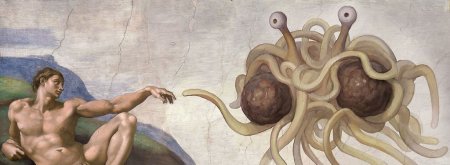Is Evolution Atheistic?
When Richard Dawkins wrote that his discovery of evolution had enabled him to be an ‘intellectually fulfilled atheist’, many Christians believed him. But Dawkins’ inference is, I think, misplaced. There is a strong tradition of evangelical Christian scientists stretching in a long lineage back to many of Darwin’s contemporaries, who are happy to absorb Darwinian evolutionary theory into the Biblical doctrine of creation.
This was the stance taken by several writers who contributed to the Fundamentals (1910-15)[1], it has been the position adopted by many Christians active in the UCCF movement as well as in the scientific community [2] and it continues to be the perspective taken today by a large number of evangelical scientists.
So how has the notion arisen that Darwinian theory is intrinsically atheistic? The answer, I would suggest, is because the ideas and scope of evolutionary theory are frequently misunderstood by Christian non-biologists, whereas atheists on their part often have little knowledge of the Biblical doctrine of creation. My purpose here is to provide a resume and critique of these misunderstandings.
Evolution as Biology and as Philosophy
The aim of evolutionary theory is to explain the origins of biological diversity. The contemporary theory contains two main steps. In Step 1, variation in genes (encoded by DNA, ‘nucleotides’ in a specified sequence) is generated by a very wide range of mechanisms, including radiation, errors in DNA replication and intrinsic chemical instability. These changes in DNA sequence are called mutations. Our own DNA is composed of around 3,000 million nucleotides, only 2% of which is used to encode genes. Each individual human differs at around 1 in 1300 of their DNA nucleotides – if it were not so we would all look identical!
In Step 2 of the theory, the genotype (total DNA) of each organism is tested out by the criterion of ‘natural selection’ regulating how many genes are passed on to succeeding generations (‘reproductive success’). This ‘filter’ is a very conservative mechanism, with a strong tendency to preserve genes that work well in a given environment. Just how conservative has been dramatically demonstrated over the past decade by the sequencing of the genomes of dozens of organisms, including human DNA. We now know that we are all carrying around in our bodies thousands of ‘molecular fossils’ – genes that are found in only slightly different forms in every living organism on the planet. About 40% of our genes are shared with fruit-flies and worms – enough to keep us humble!
So at a biological level evolution involves the unfolding of diversity by these twin balancing effects of DNA mutations (tending to variation) and natural selection (acting against variation to preserve genes that ‘work well’). This evolutionary scheme is the working hypothesis for all current biological research. Evangelical biologists believe that God has chosen to express His creative actions by generating all living creatures through this amazing process.
Unfortunately, however, many people have tried to hijack the theory of evolution to support all kinds of ideologies. Evolution has been used to support racism, communism, capitalism and other ideologies – many of them mutually incompatible. But evolution is simply a biological theory – quite incapable of such Herculean ideological tasks. Teilhard de Chardin and Julian Huxley thought that evolution was directing humankind to some supposedly future perfect state, but biologists today realise that the healing of the sick and the care of the weak to which God calls us has rendered any further evolution of humankind extremely unlikely. Jesus’ command to love our neighbour as ourselves means that with regard to Step 1 of the evolutionary process we treat everyone equally, irrespective of variations in their DNA (e.g. as expressed in skin colour) and the same command completely subverts Step 2 – natural selection.
Chance and Evolution
One misunderstanding concerns the role of chance in evolution[3]. ‘Chance’ is a slippery word and is always worth defining carefully in any discussion. ‘Chance’ is not a causal agency which makes things happen, but rather a description of the way in which we as observers understand the workings of certain events within the world around us. It is an expression of our inability to predict complicated events. Chance itself does nothing. Variation in DNA comes about by ‘chance’ events in the sense that we cannot predict them. But remember that in any case the genotype is tested by the rigorous sieve of natural selection. Overall, evolution in its totality is a tightly regulated process, restricted by the constraints of food, temperature and reproduction and of living in a world of gravity which oscillates between light and darkness. There is therefore not the slightest justification for trying to extract ‘metaphysical chance’ out of the evolutionary process – the idea that in some ultimate sense the universe has no purpose or meaning, that chance ultimately rules over all.
Recently my eldest brother died. Amazingly my other brother died on the way to his funeral. I would imagine that there is a very small chance of such a tragic event – the occurrence of brothers dying on the way to their brother’s funeral must be pretty small. Do I thereby believe that in any sense this occurrence was outside God’s sovereign plan? Of course not. Scripture constantly assures us that our Father God is sovereign over all events – even those that we ascribe to ‘chance’. Our very beings are defined by which particular sperm out of millions fertilised a particular egg, yet all Christians can echo the Psalmist’s words “You knit me together in my mother’s womb” (Psalms 139: 13). We can trust God’s sovereignty over His creative actions in the past, just as we need to trust Him now in life’s daily events.
Morality, Perfection and Evolution
A further misunderstanding comes from the idea that evolution is ‘immoral’ because it involves food chains. But the natural world is not there to teach us morality. We know God’s moral laws by Biblical revelation not by studying nature. And in any case animals, unlike us, are unable to make moral choices. The Bible describes lions roaring for their prey and seeking their food from God (Psalms 104: 21) and “Who provides food for the raven when its young cry out to God…?” (Job 38: 41). The Bible portrays God as being in charge of food chains as much as any other part of His creation.
Neither are mutations in DNA in any sense outside God’s creative will. It is, after all, mutations that help to generate the variation that make us all physically different. Genetic diversity is a reminder of our individual uniqueness in God’s sight.
Miracles and the God-of-the-gaps
Christians sometimes express the concern that if scientists can describe the creative handiwork of God in scientific terms, then this somehow undermines our notion of God as Creator. Nothing could be further from the truth. In reality the more we understand of God’s wisdom in creation, the more this leads to worship. So it is not our job to look for ‘gaps’ in our scientific accounts as if this would provide an argument for God’s existence. This idea has led to the infamous ‘God-of-the-gaps’ notion of God’s working in the world, whereby the parts of the created order that are understood by science are deemed to be ‘less special’ than the parts we don’t yet understand. ‘God’ is then used as an ‘explanation’ to plug the gaps in our scientific knowledge. But this expresses a dismally inadequate view of the Creator God of the Bible who is the Author of all that exists and “in whom all things hold together” (Colossians 1:17). It is Dawkins’ misunderstanding of creation theology at this point that is used to justify his atheism.
Creation is a seamless cloth of God’s activity. The existence of a TV drama depends upon the continual targeting of electrons on to the TV screen to generate the necessary images, and there would be no drama if the flow of electrons ceased. Similarly there would be no scientists and nothing for scientists to describe were God to cease his on-going creative and sustaining activity.
Some Christians invoke miracles to explain the origin of life, the origin of each species etc. But whereas the Bible sees God’s creative actions as wonderful and inspiring worship, it does not generally paint them in miraculous terms. Biblical miracles are those interventions of God’s grace that stand out from a backcloth of His ‘normal’ creative actions. Were it not for that consistency and faithfulness of God in creation we would be less able to recognise His miraculous interventions in the lives of His people. The medieval Church multiplied ‘miracles’ (in the sacraments and by the saints) but the Reformers pointed out that it was not glorifying to God to call something miraculous that God Himself did not.
A Real Cause of Atheism
Evolution itself is not atheistic. A robust Christian theism readily encompasses evolution as an expression of God’s creative actions. But, sadly, there are prominent scientists, like the Harvard sociobiologist E.O.Wilson, who left their earlier Christian experience to become atheists because they faced hostility to evolution. Arguably, attacks by well-meaning Christians on evolution promote rather than counteract atheism.
References
[1] D.R. Alexander, Rebuilding the Matrix – Science and Faith in the 21st Century Oxford: Lion Publishing, 2001 (hb); 2002 (pb), chapter 9.
[2] R.J. Berry (ed) Real Science, Real Faith Monarch Press, 1991; R.J. Berry God & the Biologist – Faith at the Frontiers of Science Apollos, 1996.
[3] The issues of chance and of the amorality of the evolutionary process are discussed further in Ref 1. pp.342-356.



